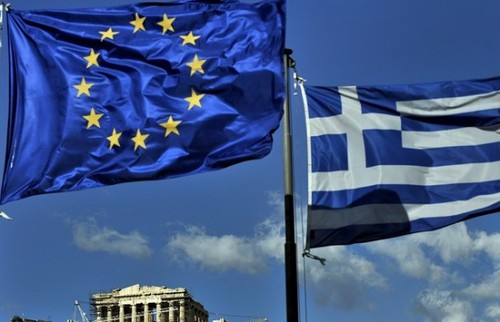(VOVworld) – The result of Greece’s referendum has created a problem for EU leaders. They now have to find a way to prevent Greece’s leaving the eurozone and perhaps causing a domino effect.

Greek - European Union flags |
If Greece’s eurozone membership is revoked, it will trigger economic losses that could total trillions of euros. It will also destroy public confidence in the strategy for building a long-term alliance in Europe. The European international creditors could possibly suffer a loss of 242 billion euros on two bailout packages and Greek government bonds managed by the European Central Bank (ECB) and several other central banks in the eurozone. A Greek exit from the eurozone has been likened to an earthquake with spreading shockwaves. EU and eurozone leaders now have to decide yes or no on Greece.
EU: an open door for Greece
After the Greek referendum on July 7, eurozone leaders held an emergency meeting in Brussels. One day earlier, French President Francois Hollande and German Chancellor Angela Merkel met in Paris and agreed that the door is still open to Greece, but the government of Prime Minister Alexis Tsipras must come up with a more realistic proposal and Greece’s wish to stay in the eurozone must be backed by a plausible long-term plan.
What does Greece say?
Following the referendum Greece made concessions by proposing reforms in exchange for an EU bailout. Prime Minister Tsipras said Athens is ready for further negotiation because it doesn’t want to leave the eurozone.
Tsipras had the support of 4 major political parties for his latest bailout proposal days after Greek voters overwhelmingly rejected Europe's latest bailout offer. He talked by telephone with ECB Director Mario Draghi and IMF Director Christine Lagarde about Greece’s economic problems and asked the ECB to continue providing emergency liquidity to Greek banks.
Challenges
The EU countries are not fully agreed on the issue. 16 of 18 eurozone countries – including Germany, Poland, the Baltic countries, and several countries in the central and southern Europe - hold the tough stance of letting Greece go. They say there is no other option for Greece but accepting drastic reforms. Only France and Italy are sympathetic to the Greek proposal. French Prime Minister Mauel Valls said there is no rule on restructuring debts. Italian Prime Minister Matteo Renzi said the eurozone has to seek a comprehensive solution to this emergency situation. If the EU continues to handcuff itself with old regulations and bureaucracy, it will collapse.
The ECB has decided not to expand the emergency liquidity package for Greece but keep it at 89 billion euros. Greek banks will run out of cash if creditors do not agree to a new bailout. The EU needs to come up with a viable plan quickly.